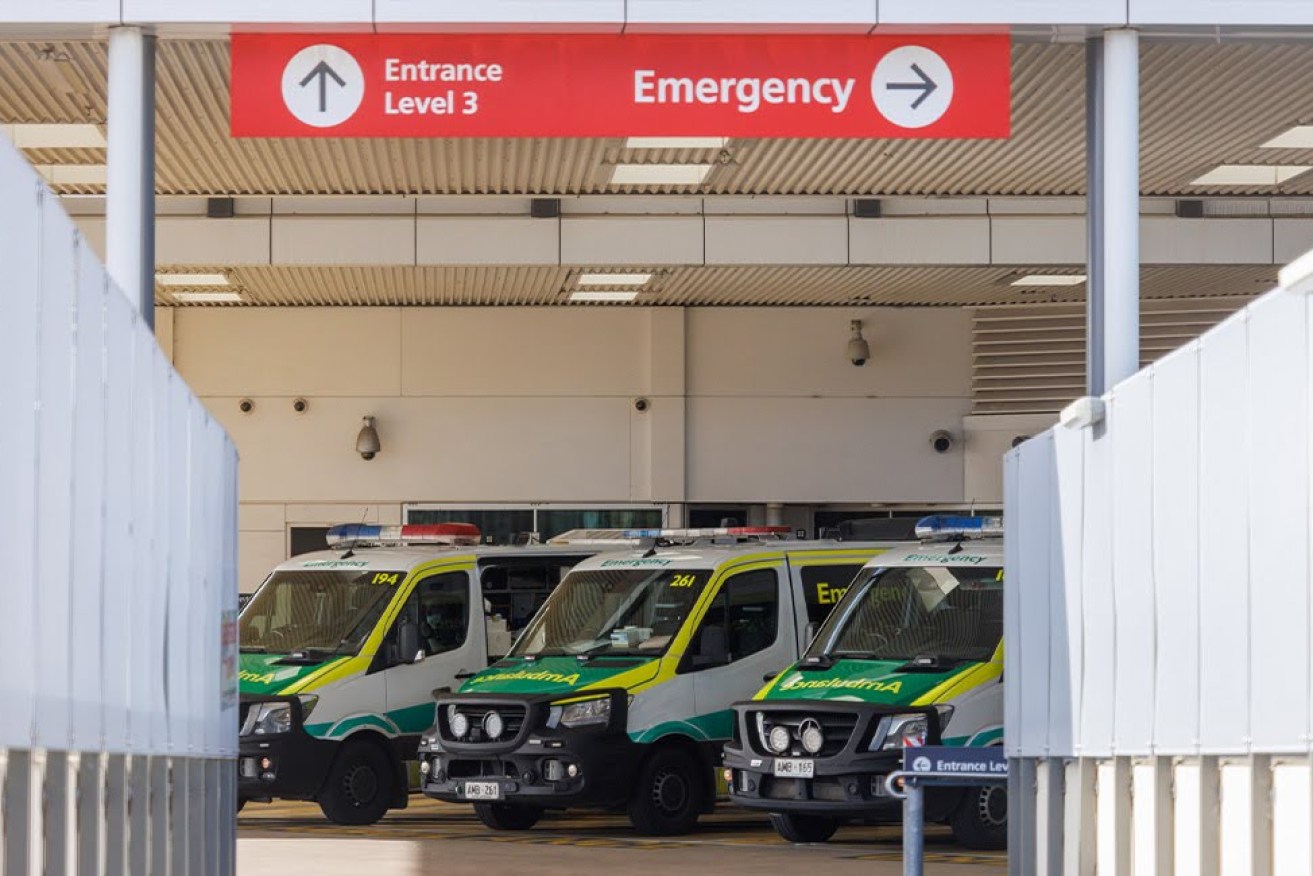SA Health data system ‘outage’ on day of intense ramping
SA Health’s electronic patient records system experienced an “outage” on Monday – a day on which ambulances spent over 83 hours ramped outside Adelaide hospitals and medical union officials were called in to inspect a “gridlocked” Flinders Medical Centre emergency department.

Photo: Tony Lewis/InDaily
A message sent to ambulance officers at 12.30pm on Monday stated that an “OPSTAT White” event had been declared for metropolitan Adelaide – meaning “operational capacity, capability and/or resources are insufficient to maintain effective service delivery for high acuity cases” and “patient safety is directly affected”.
The message also stated that SA Health’s electronic patient record systems – EPAS and Sunrise – were experiencing an outage “across all users”.

The alert that was sent to SA Ambulance workers on Monday at 12.30pm.
EPAS (Enterprise Patient Administration System) and Sunrise are electronic systems that store a person’s medical history and can be accessed by doctors, nurses and paramedics.
EPAS was introduced by SA Health at a cost of $421.5 million in 2016, but it has come under sustained criticism from clinicians for being slow, clunky and cumbersome to use.
South Australian Salaried Medical Officers Association (SASMOA) chief industrial officer Bernadette Mulholland told InDaily the systems were prone to outages.
She said Monday’s outage came at a time of intense pressure on the health system, with union officials called in to conduct a safety inspection of a “gridlocked” Flinders Medical Centre emergency department, where they reported “wall to wall patients into the night”.
“According to our doctors, it’s (EPAS) not a great system, but they (the state government) spent so much money on it that we knew they weren’t going to drop it and go somewhere else,” she said.
A spokesperson from SA Health confirmed to InDaily that a “database issue” meant around a third of “Sunrise EMR” users experienced slowness when using the system on Monday.
They said the issue was resolved within three hours.
“Business continuity plans were activated, where required, and patient care was not impacted,” they said.
Monday’s outage also came on a day when the SA Ambulance Employees Association (AEA) reported that there were over 83 hours lost to ramping – the equivalent of almost seven ambulances stuck on ramps all day due to a lack of available hospital beds to transfer patients.
AEA industrial officer Josh Karpowicz told InDaily several crews were ramped at Flinders Medical Centre for six hours on Monday.
“There were significant hours lost to ramping on Monday, so Monday was quite bad,” Karpowicz said.
“Mondays are normally bad anyway because of the lack of discharges over the weekend and lack of availability for testing and screening, so you always see ramping tend to get bad.
“But, I had a few members notify us that this Monday was worse than a usual Monday and Flinders definitely had the longest waits.”
According to the AEA, ramping continued through to Wednesday afternoon, when at 3.30pm there were 13 ambulances ramped with two having to park in the overflow area.
Earlier that afternoon, all but two Adelaide hospital emergency departments were declared at “code white” – the highest-pressure rating meaning all treatment rooms were in use.

SA Health’s emergency department dashboard at 1.30pm on Wednesday.
The AEA reported another “OPSTAT White” event was declared at 6.15pm on Wednesday evening across Adelaide and the Hills.
The union said the event was declared due to high demand and ramping.
?Wed 6:15pm: SAAS OPSTAT White across Adelaide and Hills due to high demand and ramping.
‘Operational capacity, capability and/or resources are insufficient to maintain effective service delivery for high acuity cases’ … ‘Patient safety is directly affected. pic.twitter.com/3JdbNu24TE
— Ambulance Employees Association (SA) (@aeasa1981) March 22, 2023
Southern Adelaide Local Health Network CEO Kerrie Freeman, whose network oversees the Flinders Medical Centre, said the hospital’s emergency department had experienced “continued high demand”, with people presenting to hospital who were very sick and required a high level of care, including in the ICU.
She said people who present to the ED were prioritised according to their clinical need, with high acuity cases seen first.
“We thank the community for their patience and for understanding that our staff are doing their very best. We thank our incredible staff for their outstanding commitment to caring for patients and for working together to keep people safe, particularly during periods of very high demand for services,” she said.
“A new 26 bed ward will open next week to provide acute care for older people and help to improve the flow of patients from the ED into inpatient beds.
“Additionally, a newly upgraded ward 6A has this week been completed, which includes 28 beds with cardiac monitor capability to provide inpatient care for people who present to the ED with conditions that require monitoring during a longer stay.”
InDaily asked SA Health what was causing the current surge in demand at Flinders Medical Centre but is yet to receive a response.
Latest data shows in February, ambulances spent 3036 hours – the equivalent of 126 days – stuck waiting outside Adelaide hospitals with patients due to a lack of available beds – a slight increase from 3018 hours in January.
However, February’s ramping figure is markedly lower than the high of 3838 hours in June.
Health Minister Chris Picton told parliament yesterday afternoon that the government was opening up “every possible bed that we can”.
He said the government would open an additional 26 beds at Flinders Medical Centre next Monday.
“It takes time to build additional bed capacity – you can’t flick a switch and it appears overnight – but we’re committed to delivering each and every one of our election commitments and going, in fact, even further than doing that,” he said.
“For instance, at Flinders Medical Centre, we had committed before the election to open 24 more beds, well, we’re now in the process of delivering 136 more beds at that hospital.”




